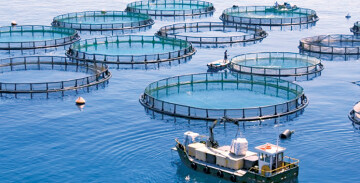
Sustainable Coastal Management
Students in the Degree Programme "Sustainable Coastal Management" writes about their studies and share their thoughts on different environmental issues.
Advantages of certifications for aquaculture farms

In recent years, people have become aware of the adverse impacts of their activities on the environment. Aquaculture is one of these activities. For example, in the case of a farm whose the main activity is fish farming, the following aspects may have impacts on the environment:
- Feed the fish: when the amount of food distributed to the fish is greater than their needs, the food not consumed remains in the environment and constitutes an important source of nutrients. Among these nutrients, nitrogen and phosphorus are known to participate in water eutrophication which is a major problem in the Baltic Sea.
- Take care of fish, maintain equipment and infrastructure: the use of medicines or all other types of products for fish care, maintenance of equipment or infrastructure or even sea travel constitutes a potential source of pollution of environment and may have impacts on the flora and fauna of the region.
For these reasons, the implementation of an environmental management system (EMS) is relevant for an aquaculture farm because it will allow the farm to determine the environmental aspects and impacts of its products and activities, to set objectives to reduce its impacts and put in place the necessary actions to achieve its objectives. The implementation of an EMS also consists of monitoring the achievement of these objectives through indicators and the implementation of corrective actions. Therefore, an EMS allows an aquaculture farm to comply with environmental regulations but also to have a competitive advantage while improving the public image of the organization. ISO 14001 is an example of certification of environmental management systems.
Other certifications can present advantages for aquaculture farms such as the FSSC 22000 certification (Food Safety System Certification 22000) including in particular the ISO 22000 certification. This assures consumers that the certified organization seeks to produce safe food for human health. In addition, a farm that seeks to feed the fish it raises with healthy products is also a farm that will have a competitive advantage over these competitors and improve its image with consumers. For example, the GMP + FSA (Feed Safety Management) standard can attest to the safety of foods used to feed fish.
Sustainable Coastal Managment
Students in the Degree Programme "Sustainable Coastal Management" writes about their studies and share their thoughts on different environmental issues.
Disclaimer: The author(s) are responsible for the facts, any possible omissions, and the accuracy of the content in the blog.The texts have undergone a review, however, the opinions expressed are those of the author and do not necessarily reflect the views of Novia University of Applied Sciences.